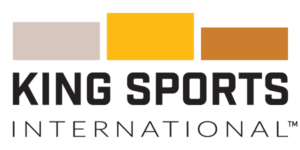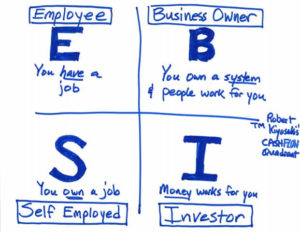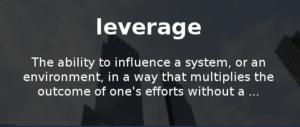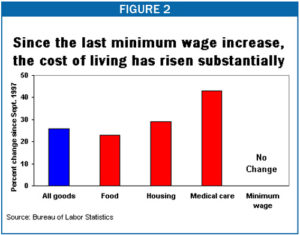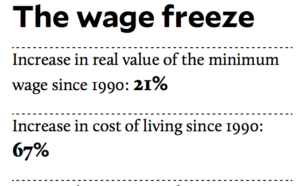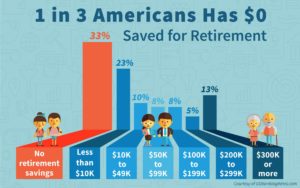A physical preparation coach enrolled in a financial education course with my company. Initially his quiz responses were typical – acknowledging that he was in a financial position that he was not happy with and felt a strong need to change. But within a unit or two his responses began changing, showing more agitation and anger. After Unit 4 he quit, and demanded a refund.
Here is an exchange with lessons for all.
Subject: Course Refund
Hello, I purchased your course on “money”. I’d like a refund of that purchase. I do not think you should be giving any financial advice based on the content that I’ve just seen. This is just the start of my issues with this so-called course. Any means at your disposal to issue a refund is highly appreciated. If you have any questions please call me. Thanks you,
–xxxx
Now I didn’t really need this email – after reading the course quiz submissions, the refund was inevitable!
Xxxx – Ian King here. I just called as you asked but only got your voice mail After my team shared your quiz responses including
* this course fucking sucks dude you are a fraud
* This is terrible – maybe you should sell your services to wall st mr king
* The world’s best economists can’t predict with relative accuracy as to what may happen in the future so how can you
I would have refunded your money irrespective of your request below, for many reasons. We have strong desire to help anyone, such as yourself who is less than excited about doing business with us, move on to service providers more suited to their needs.
We were excited to give you your money back, so you should see that refund come through. I trust you find service providers more suited to your needs to achieve your financial goals, or any other aspect of your professional development. Thanks.
–Ian King
Now you would expect a subsequent response, but you never know, and you never know what shape it will take, and here it is:
Hi Mr. King, I just finished playing basketball, so I missed your call.
Firstly, I’d like to apologize for the vulgar feedback. As a coach in this industry I appreciate and respect your longevity and wisdom as it pertains to physical preparation. So with all due respect, I regret and I apologize for my reaction.
That said, I do stand by my assessment of the course. Here is my attempt at constructive feedback.
• The delivery of the course is laborious – I believe it’s a 6 step process to read your pdf and take unit test. Way too many steps. Also, some of the links don’t work.
• The content, well, is haphazardly pieced together and the message is one of gloom and scare, and just not very good. In a course like this I think it better to discuss the following strategies: Elements of a Business Plan. How to raise money and the elements of equity and valuation (selling a business, multiplier and ebita. Taxation strategies. I can go on…. I thought I was going to get this from the course or at least a little more insight from this angle given your industry success.
• I also believe mindset is highly individual phenomenon. I think it’s dangerous to talk about this unless you know an individual on a personal level. Remember, we are all snowflakes…generalizations just don’t work. Thank you for your professional response to my very unprofessional reaction. Best,
–xxxxx
This showed enough humility to warrant reaching out and teaching I shared the following:
xxxx – thanks for your email. I have been around long enough to know that everyone deserves a chance to be emotional in their response in the heat of things, then typically calm down afterwards. Been toe to toe with some of the biggest egos in the sporting world so seen it all, so I understand where you were coming from and you have shown a lot more positive character traits in your subsequent email than your initial responses! That didn’t do you any favors but you are big enough to realize that in hindsight so good on you.
I’m also used to pushing peoples buttons in the industry. As a leader in training concepts, I almost always get abused when I released my ’new’ theories. (not new for me because I put things through a 10 year minimum testing period before I put publish them). What I have learnt from watching reactions is those that kid and thrash the most are those who are not doing what my ’new’ training method suggests, and to save face in front of their peers and clients they typically make the most vicious attacks. Then are those who take it one step further and start teaching my methods as if they originally innovated them, hoping no-one hears about their unprofessional initial responses.
So this is the price I know I pay as a person whose life works has changed the way the world trains, even though many in the world don’t know the origins due to the phenomena described above. So I have had a lot of practice being the target of vindictiveness!
One lesson I learnt from one of my may influences was a lesson from one of the worlds best platform speakers from the end of the 20th Century and a man whose cassette (yes, cassette) sales still hold the world record – Mr Denis Waitley. Denis transitioned from being a warrior (fighter jet pilot) to being a teacher of personal development, and he says “Anger is threatened values’. From this clarity I understand that when someone’s values are threatened they get angry.
When I taught that functional strength is more appropriately developed through a sequence of bodyweight unilateral to loaded bilateral movements, I felt the anger of those who were not doing this, and whose value set were the most threatened. When I taught that speed of movement in strength training can be measured, communicated using a digit timing system, and varied, I felt the anger of those who were not doing this, and whose value set were most threatened. When I taught that static stretching should precede lifting, and that control drills should precede lifting and that abdominal exercises should be done by most people most of the time as the first exercise, I felt the anger of those who were not doing this, and whose value set were the most threatened. When I taught that balance is needed in strength training and one could use my Lines of Movement concept (horizontal push and pull, hip and quad dominant), I felt the anger of those who were not doing this, and whose value set were the most threatened.
To be clear, I teach holistically and have done from the early days (that alone will be a trend in itself one day in this industry!) and therefore I also teach on the subjects of personal development, business development, financial development and spiritual development, in addition to sets and reps.
Now there are two things that could cause an industry professional to push back on me as you did. Firstly, the heresy of daring to teach ‘outside my little box’. I get the same from sports coaches when I teach technical and tactical development – I feel the anger of the coaches who were not doing the strategies I taught, and whose value set were the most threatened. Secondly the fact that I raise points that are downright confronting to individuals and the stark reality causes a defensive reaction.
I will never forget this happening in a seminar in Boston in the late 1990s. There was one particular strength coach who started out calmly in the audience, but as I unrolled my ’new’ training concepts to the audience, the steam rose in his head! I knew he was not doing any of the things I taught, and his protégés and all whom he had positioned to see him as the local ‘guru’ were in the room. It was not going to end well! He couldn’t wait to the of the day to change his ways so he did what most do when fear creates the desire to attack. He gathered his followers at the mid-morning break, convinced them the content was terrible, the delivery was terrible, and the only possible salvation was for them all to leave right then and there. They did, but to this day I am sure he knows that the only salvation was of his ego. I could have overlooked this act, as I did with yours, but his subsequent act of creating a publishing and seminar stream based on the very work he walked out on, without a single measure of the source, placed him as a lessor man than you.
You see you ‘fessed up and apologized. He just kept acting without integrity. Now where is the lesson in this? I share this with you for a number of reasons, including with the intent to help you understand that the most successfully self-promoted gurus in this industry are not the role models that I would endorse, yet they succeed in way-laying well meaning industry professionals looking for direction. As a result too many in this industry are never empowered to fulfill their own potential.
I genuinely feel for the majority misguided individual in this industry, whose role models leave them with an impossible to resolve scarcity mentality affecting all aspects of the live and family. Money is one example of this. The ego, as a colleague of mine by the name of Michael Callejas likes to say (see, it’s not difficult to give credit!) – is not your amigo!
Before I do allow me to comment on your statement:
That said, I do stand by my assessment of the course.
You have found rational reasons to support an emotional decision. That’s okay, but you don’t have to. You can let go of being right and move forward. I don’t mind too much about right and wrong. There’s a great saying – you can be right or rich. So you won’t see too much (hopefully none!) dogma in the following because I happy for anyone to be right, because my focus is elsewhere!
Now if you are still reading, I will also take time to respond to your effort of providing feedback.
1. The delivery of the course is laborious. Yes, that is right. And for the most part, that is my intention. You, had you read deeper into the course, would have learnt about my concerns about the information collecting nature of this industry. When I first released the Level 1 KSI Course as it now is, I was shattered that my life work was for the most part going to form a badge of honor – on the library shelf! I could see that most were just printing off the units and not bothering to read it. I made a decision that even if it costs me money – and it does, because as you have done, the current crop of industry professional want to be wowed with bullshit, and given a whole heap of ‘information’. I refuse to be part of that, to endorse this.
So I make you work for it. If you are not committed enough to take a few steps, you don’t deserve to get the next unit. This provides a pre-qualification filter to sort out who deserves my information, who will use it in the manner intended I.e. Apply it in a practical real world sense, where the real learning is taking place; and who is going to treat it as if most sellers do – whose primary intent is to wow you will flashy made up shit and make it as easy as possible for you to be motivated to give them your money.
So the laborious part is not going to change, although we are always looking at ways of smoothing the action steps, so this will get better with time.
Now another reason I don’t like to just ‘give’ the information but rather pre-qualify the user, is to weed out those who have the post 2000 value promoted by a certain little group who self-servingly promote its okay to lie, cheat and steal – who have no hesitation in changing the copyright symbol to their own and change the front cover! Now of course I would never be so gross as to use those words, but you get the message!
2. The links don’t work: Now let’s talk about the links not working. They actually work – they just don’t work on all computers all the time. Clearing the cache helps, but I take responsibility for this as much as I can, and we are looking to refine this over time.
3. The content, well, is haphazardly pieced together: Maybe it is, maybe it isn’t. But I can’t say yet whether the sequence or content will change – I would rather allow time in the hands of the readers who complete the course to help guide this.
I’ve only been a student of this subject with intensity for about 25 years so I am a bit green, and I will get better. I published my first book on financial education in 1999, but that might have been haphazard in your eyes also, and again I would say – maybe it is and maybe it isn’t.
4. The message is one of gloom and scare: I appreciate this concern and from memory I not only apologized for this perception but stressed that (you might have quit the course before you got to this) that it’s bad news for those who refuse to change, take action; and good news for those that are willing to face up to it, learn new habits of the mind and habits of the body. The money is not leaving the market – its just changing hands.
But yes, I can see why the majority would think what I focused on was doom and gloom. I maintain that what I have done is my best to forewarn and prepare my industry colleagues for a changing world, irrespective of whether we experience a major economic downturn during 2016 or 2017.
Perhaps you and I do not share the same views on the world – I see a world where there are too many people living one economic mishap away from economic ruin. I see a world where to many have no assets, no savings and no hope of supporting themselves in retirement. I see a world where too many children’s parents compromise on the health and time spend with them due to their economic circumstances. I think that gloomy. What I seek to do is to give people education as a lifeline to get out of these circumstances. Of course not everyone wants it. Some find id offensive, or not good enough in delivery, or haphazard or any other reason to stop the train of possible change and stay where they are.
5. You have better ideas on appropriate content: I read what you said were better ideas and content. Now let me do this as gently and as humbly as I can ‘Dude (now I don’t normally talk like that but I am using your words!) – are you the teacher or the student?!’
One of the greatest challenges in learning is being willing to empty your cup, be the student, put on the white belt.
“The greatest enemy of knowledge is not ignorance, it is the illusion of knowledge.”
—Stephen Hawking
Let’s be really brutally honest and with no disrespect, but calling a spade a spade because life’s really do depend on this – are you really in a position, based on your financial position, to be the teacher? Now I don’t make that decision. You do. It would appear you have already done so, as you fired me as your teacher.
In summary to this point, and with as much care and respect as I can muster, I am going to pass on your pointers on content. There’s a bigger lesson for you in this, but lessons are taken by students, not determined by teachers.
5. What you thought you were going to get from this course: I get this. From my double major in sociology I understand that the conditions for a revolt are set when the expectations and reality don’t meet. Having said that let me get out of theory mode and into real world talk. I don’t give you want you want, I give you what you need. If you knew, really knew what you needed, you would not be where you are today. So get over this discrepancy between what you expected and what I gave you, or stay where you are.
In the early 1990s I was just like you in this regard. I sat in a multiple thousand-dollar seminar (not a $47 one like you spat the dummy about) and expected to get days of sales and marketing. So when it was obvious that I wasn’t going to get that, rather days of personal development, I had to make a decision. Spit the dummy, demand a refund, and go home bitching and whining about the rip-off fraud that guy was. Or to say to myself – okay Ian, you tried it your way and it didn’t work. So maybe you will be better off shutting up, emptying your cup and being a student. And that, ‘dude’, was one of the great turning points in my life. So I know where you are coming from. I just can’t be on your cheer squad.
6. It’s dangerous to talk about mindset in general terms as its dangerous: Now xxxx, I think you may be scraping the barrel now but I’ll honor it as I have done the above.
Firstly, is it better to individual rather than to provide group training? Of course it is. But no-one does it. We are in an industry where more people sell group training than individualized programs!
Now on the subject of individualization. Its strange getting a lecture on this because I have been one of the strongest advocates on this subject over the last few decades. In fact one of my greatest criticisms of the industry is that the competence to individualize training is so low, it would barely move the arrow on a meter!
I’ve written often about how much angst I experience providing a generic program for what was called T-mag back in 1999. Anyone who was around then would recall the ‘Limping Program’ you know, the one where I recommended unique bodyweight exercises be integrated into conventional strength programs, and everyone thought I was a lunatic – until it became apparently popular and let to many books on the subject written by the leader of the Boston seminar walkout.
Now I went through the same pain writing programs for my four book sequel Get Buffed! As well as the Book of Muscle. Now in hindsight, did I do the wrong thing? Did I ‘damage’ anyone? Or did I help more people than hinder by this act of generalization?
xxxx you know the answer. And you probably know you are using the time-tested technique of false fear attached to an at may stop people doing stuff….Like when I was a kid and they said if you go swimming you will get a cramp and drown…but I didn’t…and then when I was a teenager they said if you do ’that’ you will go blind….and I still can see….and then in the 1990s they said if you massage someone without having a certain costly certification you will damage peoples nerves…but I didn’t….and then post 2000 the world was told that if they statically stretched they would injure and when that scare mongering wore out it was switched to ‘if you static stretch’ you will go weak…
I guess you can see what I really think about your last point!
Now for a belated conclusion. As a student, I have learnt I can shoot the messenger, or I can study the message. The more you do of one, the less you do of the other.
Yes, I responded with more than you expected, but I confess is as much for anyone who will read this as it is for you, and I don’t determine who becomes the student. I can give student tips, like leave your ego at the door, put on white belt, empty your cup, don’t preach to the teacher until you have solid evidence that you can do better….and so on. But I don’t determine who starts the journey of the student, nor do I pick who stays the path and who quits. You know what I am saying first hand!
Ian King Want to do this course? http://bit.ly/moneyandtheppcoach-prequalify
